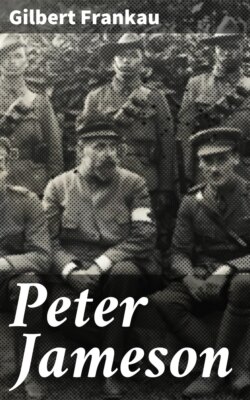Читать книгу Peter Jameson - Gilbert Frankau - Страница 24
На сайте Литреса книга снята с продажи.
§ 3
ОглавлениеTable of Contents
Nothing in the outward appearance of the Francis Gordon who rose at the entrance of his cousin’s wife, suggested the conventional (or unconventional) poet. Short dark hair parted at the side, clipped moustache, well-cared-for hands, creaseless gold-pinned soft collar, well-tailored blue suit—all proclaimed the ordinary idle young man of the period. And as such, to tell the truth, his cousin Peter—to whom, except for a certain lack of dourness about the expression, he bore an amazing resemblance—regarded him.
His surroundings, too, helped this illusion of the idle commonplace. The room was large, white-walled and green-carpeted; crowded mahogany book-shelves completely lined one wall; a spacious writing-table—scrupulously tidy—set square in the centre of two big windows—the other. Chippendale chairs, a tea-table already laid, and a revolving bookcase filled with foreign dictionaries, Roget’s Thesaurus, and other reference-works, completed the furniture. Two mahogany doors—one, through which Patricia and Peter had just entered, leading to the narrow hall—the other to the bedroom and bathroom—glowed darkly against the rough white of the wall-paper.
“This doesn’t look much like poverty,” commented Peter. (Francis had only just taken the flat. This was their first visit to him.)
“I don’t think you’d make much of a welfare inspector, old man,” replied Francis. “Fourth floor. No lift. No telephone. Geyser-bath. Shilling-in-the-slot electric-light meter. A complacent landlord. And the relics of the Curzon Street furniture. Guess again about my poverty.”
“And a manservant,” commented Patricia, taking off hat and gloves, sitting down—as by right—at the tea-table.
“Oh, Prout! Prout would pay to stay on, I believe. Francis Gordon and his faithful valet; or the loyalty of an old retainer. …”
But Patricia knew that the supercilious remark hid real affection for that “old bounder Prout.” She had seen a good deal of Francis since his return to England; revised many of her early unfavourable opinions about him. The good-will was mutual: though Francis, who still thought “Pat.” rather a commonplace young woman, would have been more than surprised to know how near she had come to divining the change in his mentality—and the real reason for that change.
“Who’s this?” commented Peter, his inspection of the new quarters having brought him to Beatrice’s photograph.
“Friend of mine,” said Francis curtly. “Don’t touch those papers.”
“I won’t touch your precious papers.”
At which little passage of arms, Patricia’s last doubts settled into a comfortable certainty.
Prout, bringing tea, restored harmony. They sat long over it, smoking and talking—mostly, as is the habit of near relations, about themselves.
“By Jove,” said Peter—interrupting himself in the middle of a long monologue about advertising—“I almost forgot. We’ve taken a house at Wargrave for a month. Lodden Lodge. It’s rather a decent place. Tennis lawn; river-frontage; bath, h. and c.; usual domestic offices; et cetera et cetera. You are expected to stay with us.”
“Hukkum hai? (Is it an order?),” asked Francis.
“Oh, we all know you spent three months in India,” chaffed Peter. “Question is: are you coming?”
“Of course I’m coming,” said Francis, “and so is Prout—if Patricia doesn’t object.”
